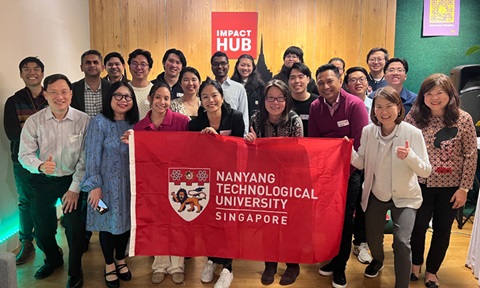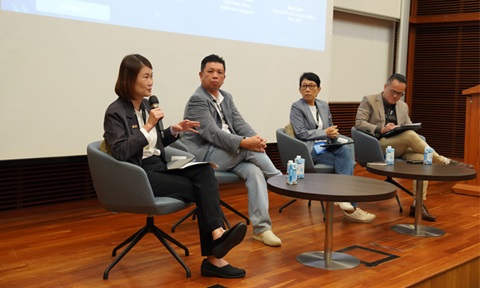Unicorn dream come true
In conversation with Dr Shi Xu, Founder and Executive Chairman of Nanofilm Technologies International, and Chairman of NTUitive.
Text: Lester Hio
Singapore’s first deep-tech unicorn Nanofilm Technologies has its roots at NTU. Founded by former School of Electrical and Electronic Engineering associate professor Dr Shi Xu, the company was spun off from the University in 1999.
Today, the company is listed on the Singapore Exchange and is valued at over S$2 billion.
We speak to Dr Shi about his personal journey of transformation from academic to executive.

Researcher vs businessman: How different have these experiences been?
Both the business and academic worlds are important areas of work. For me, I want to innovate and create things that people can use. So in that sense, running a company offers me more opportunities to do so, and that, right now, is more satisfying.
It’s a bit more philosophical running a business. I find it more personally satisfying and I hope to make an impact on the world and do something worthwhile.
Your company is now a publicly-listed billion-dollar multinational company. How do you feel seeing it grow over the past 20 years?
It is just like seeing your kid grow into adolescence, and then into adulthood. Now, it has wonderful prospects in the future ahead – it’s a wonderful feeling.
You had just received tenure as a professor – an academic position many others would envy – shortly before Nanofilm was founded. Why give that up for the uncertainty of a start-up?
Yes, in 1999, I had obtained tenure, and back then, academics in Singapore were generally paid very well. I really had nothing to complain about.
Founding a company offered me endless possibilities – in terms of prosperity, areas of work, products.
So when the opportunity came, I took it. But it wasn’t easy – there were obstacles after obstacles, failures after failures.
Can you share what some of these obstacles and challenges were, and how did you cope?
It was an uphill struggle but we had nothing to lose. There was no downside.
When the hard disk drive industry consolidated, it was very unexpected, and had a big impact. For two years after that, I took a pay cut to see the company through. My wife had always been working too, as a polytechnic lecturer, and was able to support the family on her salary. Our family is a simple family, so we didn’t have any high expectations or luxurious lifestyles. I didn't have any sort of debt or negative cash flow. Thankfully, we never entered into a real situation where the company couldn’t continue and had to shut down. We could still pay salaries.
 In 2017, Dr Shi was named EY Entrepreneur Of The Year and Entrepreneur Of The Year for advanced manufacturing. Photo: Ernst & Young
In 2017, Dr Shi was named EY Entrepreneur Of The Year and Entrepreneur Of The Year for advanced manufacturing. Photo: Ernst & Young
What are some of the key takeaways from that experience?
It’s important to have business knowledge, especially for people in science and technology. If you can, learn a bit about business – about finance, accounting, corporate organisation.
This is important for researchers, because then they can apply their research to the business world. Otherwise, if you want to do a start-up, if you want to grow the business, then you are at other people’s mercy if you have no business knowledge.
Nanofilm has come a long way. Share your thoughts on this journey so far?
I feel a lot more responsibility now. There’s pressure from stakeholders, and you have to be responsible to your staff.
This in a way led me to my own self assessment. I had to find out really where my strengths are, and where my bandwidth is so that I can focus on the areas I am best at, to make the best contribution to the company's growth. It's like soul-searching.
So how is this soul-searching coming along?
I’m good at thinking about the direction where the company can grow and survive as long as possible, and which new areas to go into.
When I first started running the company, I had a dream. The main goal was always to grow the company and finally get it publicly listed, and then to grow further from there. But the reality was harsh. As a result, it took us 20 years.
I’ve learnt that I need a lot more people, more talent, to run the company.
You had a young family at the time Nanofilm was born. What was it like managing family life and your start-up?
My son was born the same year I established Nanofilm in 1999. My daughter was then four years old.
It was a difficult time. We had just started work with our first commercial partner, Hitachi, in Tokyo. I spent a lot of time travelling there to make it work, to troubleshoot issues.
At the time, my wife was on the verge of delivery. Then, a problem cropped up. I told her I had to fly to Tokyo as the customers were getting angry. I said: “Can we have him delivered today, induce the delivery?” She was shocked and scolded me: “You can’t even wait just for a few days, and have to say something so desperate?”
Luckily, my son was naturally delivered that night. It was really a blessing. He was born just past midnight, and the day after, I brought my wife and son back home and then flew to Japan.
Do you envision Nanofilm to be a family business for you to pass along one day?
It was never my intention to make Nanofilm a family business. I always believe the kids should always follow their own potential and pursue the things they really like.
My two kids are polar opposites.
My daughter is studying art; she's becoming an artist for character design – entirely different from this (deep-tech business).
My son has a scientific brain; he's studying physics at Cambridge now. I encourage him to continue studying. If he likes research, he can pursue a doctorate and think about what to do later.
School is time to learn how to focus, to train your brain, to understand the world better. It’s where you develop logical thinking and analytical abilities.
But no, succeeding me in the company is not a priority.
This article first appeared in the first issue of U, the NTU alumni magazine.







